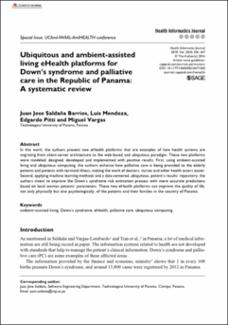El sistema se apagará debido a tareas habituales de mantenimiento. Por favor, guarde su trabajo y desconéctese.
Ubiquitous and ambient-assisted living eHealth platforms for Down’s syndrome and palliative care in the Republic of Panama: A systematic review
| dc.contributor.author | Saldaña Barrios, Juan José | |
| dc.contributor.author | Mendoza, Luis | |
| dc.contributor.author | Pitti, Edgardo | |
| dc.contributor.author | Vargas Lombardo, Miguel | |
| dc.date.accessioned | 2023-02-06T15:57:35Z | |
| dc.date.available | 2023-02-06T15:57:35Z | |
| dc.date.issued | 2018-12 | |
| dc.identifier.uri | https://ridda2.utp.ac.pa/handle/123456789/17363 | |
| dc.description | In this work, the authors present two eHealth platforms that are examples of how health systems are migrating from client-server architecture to the web-based and ubiquitous paradigm. These two platforms were modeled, designed, developed and implemented with positive results. First, using ambient-assisted living and ubiquitous computing, the authors enhance how palliative care is being provided to the elderly patients and patients with terminal illness, making the work of doctors, nurses and other health actors easier. Second, applying machine learning methods and a data-centered, ubiquitous, patient’s results’ repository, the authors intent to improve the Down’s syndrome risk estimation process with more accurate predictions based on local woman patients’ parameters. These two eHealth platforms can improve the quality of life, not only physically but also psychologically, of the patients and their families in the country of Panama. | en_US |
| dc.description.abstract | In this work, the authors present two eHealth platforms that are examples of how health systems are migrating from client-server architecture to the web-based and ubiquitous paradigm. These two platforms were modeled, designed, developed and implemented with positive results. First, using ambient-assisted living and ubiquitous computing, the authors enhance how palliative care is being provided to the elderly patients and patients with terminal illness, making the work of doctors, nurses and other health actors easier. Second, applying machine learning methods and a data-centered, ubiquitous, patient’s results’ repository, the authors intent to improve the Down’s syndrome risk estimation process with more accurate predictions based on local woman patients’ parameters. These two eHealth platforms can improve the quality of life, not only physically but also psychologically, of the patients and their families in the country of Panama. | en_US |
| dc.format | application/pdf | en_US |
| dc.language.iso | en_US | en_US |
| dc.rights | info:eu-repo/semantics/openAccess | en_US |
| dc.rights | https://creativecommons.org/licenses/by-nc-sa/4.0 | en_US |
| dc.subject | ambient-assisted living | en_US |
| dc.subject | Down’s syndrome | en_US |
| dc.subject | eHealth | en_US |
| dc.subject | palliative care | en_US |
| dc.subject | ubiquitous computing | en_US |
| dc.title | Ubiquitous and ambient-assisted living eHealth platforms for Down’s syndrome and palliative care in the Republic of Panama: A systematic review | en_US |
| dc.type | info:eu-repo/semantics/article | en_US |
| dc.type | info:eu-repo/semantics/publishedVersion | en_US |
